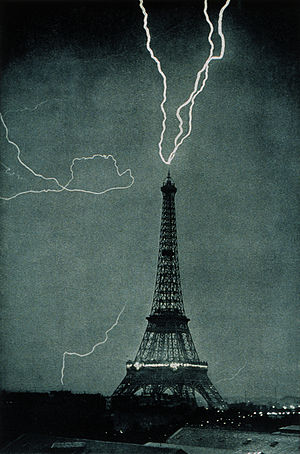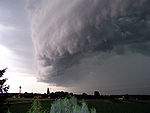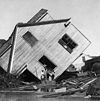
Back بوابة:طقس Arabic دەروازە:کەش و ھەوا CKB Portál:Meteorologie Czech Portal:Wetter und Klima German Portail:Météorologie French Portale:Meteorologia Italian Portal:気象と気候 Japanese 포털:날씨 Korean Portāls:Meteoroloģija Latvian/Lettish Portal:Pogoda Polish
The weather portal
Weather is the state of the atmosphere, describing for example the degree to which it is hot or cold, wet or dry, calm or stormy, clear or cloudy. On Earth, most weather phenomena occur in the lowest layer of the planet's atmosphere, the troposphere, just below the stratosphere. Weather refers to day-to-day temperature, precipitation, and other atmospheric conditions, whereas climate is the term for the averaging of atmospheric conditions over longer periods of time. When used without qualification, "weather" is generally understood to mean the weather of Earth.
Weather is driven by air pressure, temperature, and moisture differences between one place and another. These differences can occur due to the Sun's angle at any particular spot, which varies with latitude. The strong temperature contrast between polar and tropical air gives rise to the largest scale atmospheric circulations: the Hadley cell, the Ferrel cell, the polar cell, and the jet stream. Weather systems in the middle latitudes, such as extratropical cyclones, are caused by instabilities of the jet streamflow. Because Earth's axis is tilted relative to its orbital plane (called the ecliptic), sunlight is incident at different angles at different times of the year. On Earth's surface, temperatures usually range ±40 °C (−40 °F to 104 °F) annually. Over thousands of years, changes in Earth's orbit can affect the amount and distribution of solar energy received by Earth, thus influencing long-term climate and global climate change.
Surface temperature differences in turn cause pressure differences. Higher altitudes are cooler than lower altitudes, as most atmospheric heating is due to contact with the Earth's surface while radiative losses to space are mostly constant. Weather forecasting is the application of science and technology to predict the state of the atmosphere for a future time and a given location. Earth's weather system is a chaotic system; as a result, small changes to one part of the system can grow to have large effects on the system as a whole. Human attempts to control the weather have occurred throughout history, and there is evidence that human activities such as agriculture and industry have modified weather patterns.
Studying how the weather works on other planets has been helpful in understanding how weather works on Earth. A famous landmark in the Solar System, Jupiter's Great Red Spot, is an anticyclonic storm known to have existed for at least 300 years. However, the weather is not limited to planetary bodies. A star's corona is constantly being lost to space, creating what is essentially a very thin atmosphere throughout the Solar System. The movement of mass ejected from the Sun is known as the solar wind. (Full article...)
Selected article

Recently selected articles: Cyclogenesis, 1933 Atlantic hurricane season, More...
Did you know (auto-generated) -

- ... that an attempted British-Norwegian attack on the German battleship Tirpitz was abandoned after two Chariot manned torpedoes were lost due to bad weather?
- ... that Eric Berger wrote about weather for the Houston Chronicle even before he became a certified meteorologist?
- ... that weather whiplash is the phenomenon of rapid swings between extremes of weather conditions?
- ... that in the 1980s, "Sherman Bonner, The Human Thermometer" presented the weather on an Arkansas TV station?
- ... that after Irish post office clerk Maureen Flavin Sweeney reported worsening weather conditions, Dwight D. Eisenhower agreed to postpone D-Day by 24 hours?
- ... that the weather forecast for HD 189733 b is "Westerly winds at 2000 m/s, with molten glass showers"?
Selected image

Lightning striking the Eiffel Tower on the night of June 3, 1902. This is one of the earliest photographs of lightning in an urban setting.
Recently selected pictures: Cyclone Catarina, Roll cloud, Hoar frost, More...
More did you know...
...that the Flying river is the name given to the transport of water vapor from the Amazon rainforest to southern Brazil?
...that hurricane shutters are required for all homes in Florida unless impact-resistant glass is used?
...that the Joint Institute for Marine and Atmospheric Research is a combined weather and ocean research institute with the cooperation of the Office of Oceanic and Atmospheric Research and the University of Hawaiʻi?
...that the SS Central America was sunk by a hurricane while carrying more than 30,000 pounds (13,600 kg) of gold, contributing to the Panic of 1857?
...that a hurricane force wind warning is issued by the United States National Weather Service for storms that are not tropical cyclones but are expected to produce hurricane-force winds (65 knots (75 mph; 120 km/h) or higher)?
...that the Automated Tropical Cyclone Forecasting System is a software package for tropical cyclone forecasting developed in 1988 that is still used today by meteorologists in various branches of the US Government?
Recent and ongoing weather
- Wikinews weather portal
- March 26, 2021: Tropical moisture ceases to cause severe floods in South East Australia
- February 19, 2021: Winter storms hammer Texas, fatalities reported
- December 28, 2021: Typhoon Phanfone strikes Philippines
- February 1, 2022: Deadly floods in Brazil after heavy rainfall
- April 15, 2022: South African floods kill at least 300 people
- Weather of 2024
- 2024 Atlantic hurricane season
- 2020–21 North American winter
- 2024 Pacific typhoon season
- Tornadoes of 2024
This week in weather history...
July 18
2014: Typhoon Rammasun, only the second category 5 tropical cyclone in history to made landfall on China, struck Hainan, killing 88 people across the country.
July 19
1996: Unprecedented rainfall started the Saguenay flood, killing at least seven people and causing as much as $1.5 billion (CAD) in damage in the Saguenay–Lac-Saint-Jean region of Quebec.
July 20
2008: Hurricane Bertha, the longest-lived July Atlantic hurricane on record, dissipated over Atlantic Canada.
July 21
1909: A major hurricane made landfall at Velasco, Texas, killing 41 people.
July 22
2006: Hurricane Daniel reached peak intensity over the open Pacific Ocean, with maximum sustained winds of 130 knots (150 mph; 240 km/h).
July 23
2012: Typhoon Vicente made landfall over Taishan, Guangdong, China. The storm killed 32 people, in addition to causing an environmental disaster when 7 shipping containers of polypropylene plastic pellets were washed into the sea near Hong Kong.
July 24
1979: Tropical Storm Claudette made landfall near the Texas/Louisiana border, causing record rainfalls and $400 million dollars (1979 USD) in damage.
Selected biography
Sir William Napier Shaw FRS (4 March 1854 – 23 March 1945) was a British meteorologist. He introduced the tephigram, a diagram for evaluating convective instability in the atmosphere. He also served as president of the International Meteorological Committee and Royal Meteorological Society. (Full article...)
Previously selected biographies: Johannes Letzmann, Ted Fujita, More...
Related portals
Quality content
Other candidates:
- Featured Article Review: 2005 Atlantic hurricane season (Discussion)
- Featured List Removal Candidate: List of storms in the 2005 Atlantic hurricane season (Discussion)
Subcategories
WikiProjects
The scope of WikiProject Weather is to have a single location for all weather-related articles on Wikipedia.
WikiProject Meteorology is a collaborative effort by dozens of Wikipedians to improve the quality of meteorology- and weather-related articles. If you would like to help, visit the project talk page, and see what needs doing.
WikiProject Severe weather is a similar project specific to articles about severe weather. Their talk page is located here.
WikiProject Tropical cyclones is a daughter project of WikiProject meteorology. The dozens of semi-active members and several full-time members focus on improving Wikipedia's coverage of tropical cyclones.
WikiProject Non-tropical storms is a collaborative project to improve articles related to winter storms, wind storms, and extratropical cyclones.
Wikipedia is a fully collaborative effort by volunteers. So if you see something you think you can improve, be bold and get to editing! We appreciate any help you can provide!
Associated Wikimedia
The following Wikimedia Foundation sister projects provide more on this subject:
-
Commons
Free media repository -
Wikibooks
Free textbooks and manuals -
Wikidata
Free knowledge base -
Wikinews
Free-content news -
Wikiquote
Collection of quotations -
Wikisource
Free-content library -
Wikiversity
Free learning tools -
Wiktionary
Dictionary and thesaurus
Other Portals
What you can do
© MMXXIII Rich X Search. We shall prevail. All rights reserved. Rich X Search
































